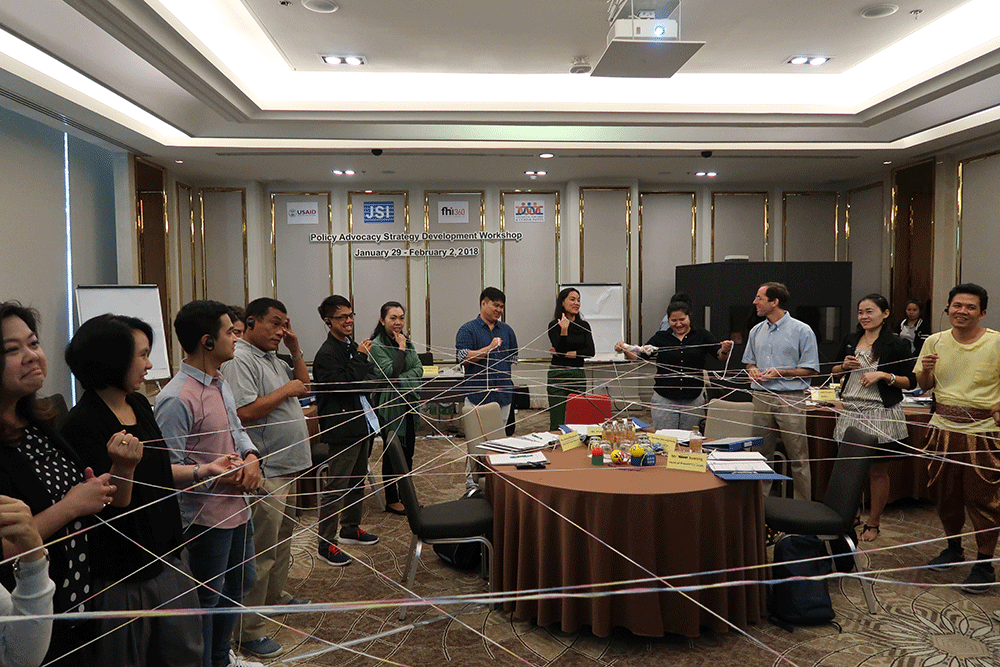A learning package focused on developing an advocacy strategy, specifically to advocate for policy change to address barriers to HIV prevention, care, and treatment services.
This five-day curriculum is broken into 15 modules; a facilitator’s manual provides overall guidance on how to use the module components including, session plans, PowerPoint slides, and participant handouts for use during the sessions and as job aids after the workshop concludes.
APC created this curriculum as part of the PEPFAR-funded Local Capacity Initiative, which strengthened sustainability of national HIV and AIDS responses in 14 countries and regions. As part of the program, APC provided technical assistance to increase the advocacy capacity of local nongovernmental organizations (NGOs).
Facilitator’s Manual - Provides background on the workshop, tips for preparation, and sample agendas, as well as the pre-work assignment and pre-/post-test.
Session 1: Opening Session - Welcomes participants to the workshop; reviews expectations, the agenda, and ground rules; and sets the tone of the workshop.
Session 2. Key Concepts and Definitions - Introduces basic elements of policy advocacy, provides definitions of key concepts, differentiates advocacy from similar concepts, and identifies types of policy change.
Session 3. The Policy Development Process - Reviews policy development frameworks, the basic steps of the policy development process, and which advocacy activities to use when advocating for change.
Session 4. Overview of Steps in Advocacy Strategy Development - Introduces the steps to develop and implement an advocacy strategy.
Session 5. Define the Issue and Identify a Policy Solution - Introduces methods to define a policy issue, including criteria to assess whether an issue is well suited for advocacy and the most appropriate policy solution.
Session 6. Set Goals and Objectives - Introduces goals and objectives of policy advocacy strategies and allows participants to develop goals and objectives for advocacy strategies they are creating.
Session 7. Identify Target Audiences: Decision-makers and Influencers - Defines target audience, decision-maker, and influencer; reinforces the importance of knowing your primary and secondary target audiences and capturing information about stakeholders in a power map.
Session 8. Engage in Partnerships - Reviews the various types of partnerships, the characteristics of successful teams, and creating and maintaining effective partnerships.
Session 9. Create Effective Advocacy Communication - Introduces the components of, and the process for developing and delivering, an effective advocacy message; allows participants to design and deliver a message for their advocacy strategy.
Session 10. Plan Advocacy Activities - Reviews the types of activities that can be used to support advocacy objectives and identify specific activities to support an objective in the advocacy strategy.
Session 11. Assess Resources - Identifies the resources needed to implement an advocacy strategy and plan how to obtain them.
Session 12. Monitor and Evaluate Policy Advocacy - Reviews basic principles of monitoring and evaluation (M&E) and the use of M&E to demonstrate progress toward accomplishing advocacy goals and objectives.
Session 13. Draft the Advocacy Strategy - Provides participants the opportunity to compile the work completed during the workshop into a draft advocacy strategy.
Session 14. Present Advocacy Strategies - Presents opportunities for small groups to receive constructive feedback on their draft strategies from facilitators and other participants.
Session 15. Closing - Ensures that expectations were met; evaluations and closing remarks.






























